DO-IT News December 2008

Volume 16, Number 3
Below are the articles of the DO-IT News December 2008 newsletter. These articles can also be seen all on one page at the Full Newsletter option.
Director's Digressions
I am excited to report that DO-IT is once again partnering with the Department of Computer Science & Engineering at the University of Washington (UW) to extend the activities of the successful Alliance for Access to Computing Careers (AccessComputing).
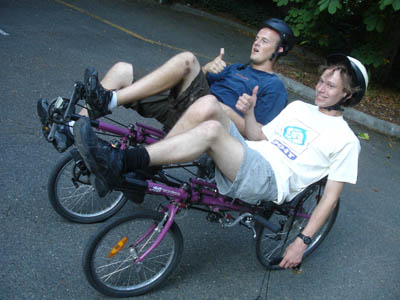
The enhanced AccessComputing project is funded by the National Science Foundation's Directorate of Computer Information Science and Engineering (grant #CNS_0837508). It continues to build the nationwide network of universities and organizations that was developed in the first project. This multidisciplinary network offers activities to increase the number of students with disabilities who successfully earn associate, baccalaureate, and graduate computing degrees and enter the computing workforce. Network leaders identify potential computing students with disabilities and give them the support and tools needed to succeed.
AccessComputing engages individuals with disabilities as well as those who support, serve, guide, educate, and employ them. Specifically, AccessComputing now serves to:
- increase the capacity of postsecondary institutions, pre-college educators, veteran associations, projects that broaden participation in computing, and businesses to fully include individuals with disabilities in computing fields
- create lasting relationships with stakeholders that foster systemic changes toward inclusiveness in computing education and careers
- implement mentoring and internships to increase the number of individuals with disabilities moving into computing careers
- expand an online resource center to share research and promising practices worldwide
Ultimately, AccessComputing will open the door to computing opportunities for more people and, as a result, enhance the field with the talents and perspectives of people with disabilities. More information on this program is available at www.washington.edu/accesscomputing.
Summer Study '08: What Do the Phase I Scholars Do?
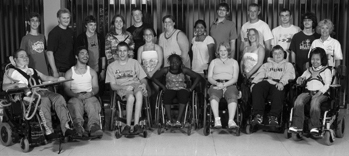
DO-IT Phase I Scholars participate in a two-week, live-in Summer Study session on the University of Washington campus in Seattle. They learn about college life; explore the Internet; interact with peers, staff, and mentors; and have fun. The DO-IT Scholars program started in 1993 as an experimental project for teens with disabilities nationwide. It is open to Washington State teens and is supported by the State of Washington, the Boeing Company, and the Microsoft Corporation.
University Village Outing
During the first week of Summer Study, Phase I Scholars visited University Village, a large shopping area near the UW. It was awesome! The trip gave us the opportunity to get to know each other as we walked around shops, plus we got to go to Starbucks (a treat that we truly enjoyed). There were a lot of laughs throughout the evening. We all wished that we had just a little more time to hang out there.
Tour de UW
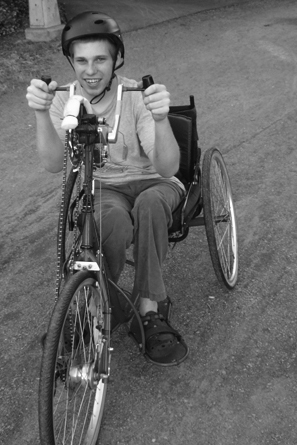
Tour de UW was a great experience for everybody during Summer Study. During the tour, we explored the UW campus on different kinds of bikes designed for people with physical disabilities. The bikes introduced us to new ways of biking that we had never experienced before. It was interesting seeing the different kinds of steering mechanisms that the bikes had, and, because of this, how some were harder to steer than others. During the bike ride we took a few interesting detours. We flew past the cone that designated the turn-around point and pedalled what seemed like halfway to Woodinville, WA! Also, a bike broke down, and emergency bicycle surgery had to be performed.
Riding a hand crank bike was fun but was also exhausting. It is amazing how much the view changes when riding lower to the ground. Since the steering on the modified bike was completely different than a regular bike, navigating on the hills was a real challenge.
Everybody had a great time biking and socializing. By the end of the night many of us were tired and ready for a break. At the beginning of the night several people ran down to the bikes, but afterwards, nobody ran back up the hill to the dorms!
Microsoft Past, Present, and Future
At Summer Study, the Phase I Scholars and Interns went to Microsoft headquarters located in Redmond, WA. We left the UW at 10:15 a.m. and returned to campus at 4:00 p.m. We began our tour in one of Microsoft's many conference rooms. Once we were all settled, we were introduced to a panel of Microsoft employees with disabilities. After introductions, we asked about their professions, disabilities, and their lives in general. We then heard a presentation on the computer dictation program for Windows Vista that responds to voice commands. It was amazing!
After all that excitement, we went to Microsoft Studios where training videos and executive presentations are created. Split into two separate groups, we visited the control room, the green studio room, and the white studio room. The white studio room is used to film high definition video.
The studios were great, but the real fun began after the tour when we visited the Microsoft Museum and Visitor's Center. We saw Microsoft's timeline that showed important milestones from the company's beginnings to the present. The timeline displayed Microsoft's growth and contributions to our world, especially in the lives of people with disabilities. For this we are grateful and we say thank you from the bottom of our hearts. The world is ours to grasp and do what we are most passionate about!
Wild Things: Our Trip to the Zoo
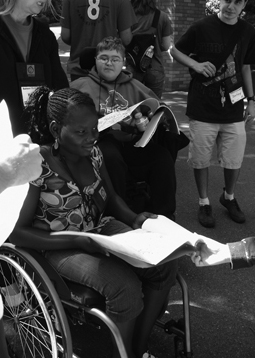
On the Sunday of our first week at Summer Study, the DO-IT Scholars went to the Woodland Park Zoo. It was a blast! Our first reaction when we saw the zoo was, "This looks like fun!" We were right. We were split into groups and set off to explore. Our group leader made the experience a lot of fun. For most of us, memories of visiting the zoo in childhood flooded back, but this experience seemed even better. A favorite part of the zoo for many Scholars was the gift shop where we got stuffed animals, a frog named Rainbow, a leopard named Billy Bob, and a fish scale that is used as a natural nail file and callus remover. All the animals at the zoo were amazing. Among the most exciting was what looked like one huge snake. What we did not know was that there were two snakes in the cage. We have many great memories from our visit to the zoo.
Spaced Out
When we, the Phase I Scholars, went to the UW's planetarium for the Spaced Out class, we piled into comfortable seats in a round and slightly darkened room. Once we were settled, a UW graduate student began to talk about space and astronomy. Then the lights went out completely and we saw the night sky with all the stars. One thing we learned about stars and space was that the three so-called "stars" on Orion's Belt are not really stars at all but are places where stars are formed. Another thing we learned was that there is a star called Sirius. This was interesting because Sirius Black is a character in the Harry Potter series, and all of the Black family members in Harry Potter are named after stars.
We also saw the Northern Lights; learned about Polaris (the North Star); and heard about Crux, the Southern Cross, which is used by navigators to mark south. Overall, Spaced Out was a blast because all the things we did inside the planetarium felt like we were really outside watching the night sky. Spaced Out took our minds off of any earthly troubles.
The IMAX Experience
The IMAX Theater production of Batman the Dark Knight was stunning. It was projected on a huge floor-to-ceiling screen and the sound came from a 12,000 watt digital sound system. We all agree that Batman the Dark Knight was one of the greatest movies that we had ever seen, and the IMAX was the greatest way to watch it. The big screen and the sound system made all the difference.
The IMAX theater in Seattle was very disability friendly. The theater had a ramp that made it very easy to access with a wheelchair. Also the restrooms were very large and easy to access with a wheelchair. The staff members at the IMAX were very understanding and they were able, for the most part, to accommodate our needs. An area for improvement is offering better accommodations for people who are deaf.
Summer Study '08: What Do the Phase II Scholars Do?
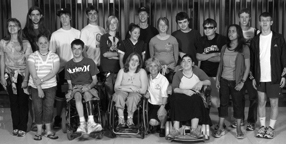
Phase II Scholars return to the University of Washington campus for their second Summer Study. They meet the Phase I Scholars, learn about college life and career preparation, and participate in a one-week workshop with postsecondary instructors.
HIT the Note!
Held at a local all-ages jazz club in Seattle, the Hit the Note! workshop was taught by researchers Suzanne and Peter from the UW's Human Interface Technology department, also known as the HIT Lab. The goal of HIT the Note! was to generate a "mixed reality graphic interactive performance piece."
To participate in the workshop, DO-IT Scholars and a DO-IT Intern traveled off campus each day at 8:30 a.m. to Egan's Ballard Jam House and returned at noon. The team used a variety of software programs and equipment to create the video. 3DMeNow allowed the team to animate pictures of themselves. Spore Creature Creator, a downloadable demo from the manufacturer of Sims, was used to customize animated creatures. Animation was created with a program called Line-Rider, which creates roller coaster-like paths. The final iMovie we created was set to the song from the Average White Band titled, "Pick up the Pieces."
What Do You NOAA?
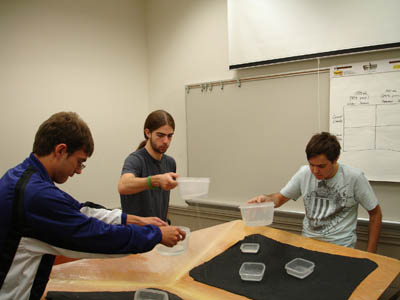
During this summer of unseasonably cool weather in Western Washington, the dire predictions of global warming are not always at the forefront of our minds. However, after an intense week of study, the DO-IT Scholars in the NOAA Climate Change workshop can tell you just how important it is that we continue to study climate change and make everyday efforts to reduce our negative impact on the environment.
The Scholars jumped right into the workshop, learning a lesson from the people of Easter Island who destroyed their own society by using up all of their natural resources. Having set the tone for the importance of preserving the environment and the catastrophic effects that humans can have on it, Kevin Bernadt of the Environmental Protection Agency expanded on the causes and possible effects of climate change. With their new font of environmental knowledge, the Scholars investigated the process of taking scientific fact and using it to inform and create public policy. The following day, several UW graduate students presented the effects of climate change in the Northwest, and the Scholars happily flooded the classroom during a watershed demonstration showing how much more devastating floods can be when the water from melted snow packs and glaciers is added to usual amounts of rainfall. Thursday was the final day of class, and the Scholars took a trip to the NOAA regional headquarters where they saw the main weather floor, played with instruments used on research cruises, and learned how to read weather maps.
It was an intense week, but everyone survived. It wouldn't be surprising if, in a few years, we see these DO-IT Scholars in the field developing efficient alternative energy resources, in congress pushing for even tougher environmental protection laws, or on TV giving us our seven-day forecast.
The Game of Life
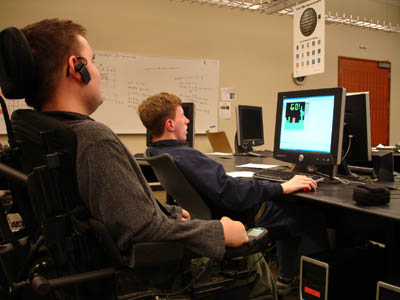
After having ventured across campus to the Paul G. Allen Center for Computer Science and Engineering, descending to the basement, and entering a windowless classroom, Phase II Scholars Lukas and Luke knew right away this was the right workshop for them. This was their introduction to The Game of Life. The game was developed by mathematician John Horton Conway. As explained by Interns Taylor and Nate, the game is important because it represents real-life cellular patterns, and it can be used to explain natural phenomena, such as the stripes of a zebra.
The game is a simple computer solitaire game played on a grid of squares called cells. The cells are either alive or dead. If a cell is alive it is colored; if a cell is dead it is black. Certain rules determine whether the cell is alive or dead, and these rules are programmed into the computer. The rules can vary, but the standard set of rules for The Game of Life are as follows:
- Cells that are alive and have two or three neighboring live cells continue to live; otherwise they die because of either overcrowding or loneliness.
- Cells that are dead must have exactly three neighboring cells in order to become alive again.
Each Scholar used these rules to create different results, which they demonstrated and explained during their final presentation.
Digitize to Save the Planet!
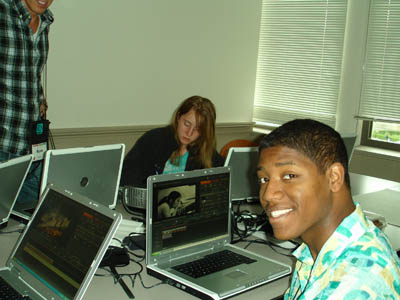
Quiet on the set!
Places everyone!
Action!
This summer, DO-IT Scholars participated in a new project conducted through the Pearson Foundation's Digital Arts Alliance and the Jane Goodall Institute. The project was created to challenge youth to portray an environmental concern through film. Four Phase II Scholars participated in the project, which was led by Pearson instructors Beth and Ryan. Each Scholar learned to use Adobe Premiere Element (film editing software) and created a short film that focused on an environmental issue. Amrit, Ashlee, Blake, and Liz decided on a topic, conducted research, and created the film. Film topics included energy efficient automobiles, forest conservation, water conservation, and water pollution. Each film premiered at DO-IT's Summer Study 2008 Closing Ceremonies to rave reviews.
BioToy Factory
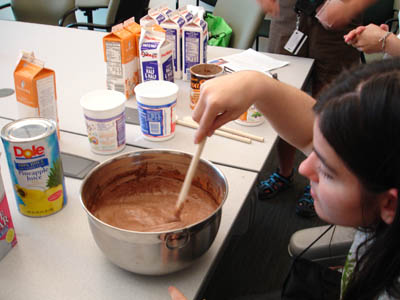
Phase II DO-IT Scholar, Jen, Stirring a bowl of what will become chocolate ice cream
The BioToy Factory workshop was led by UW bioengineering graduate students. DO-IT Scholars had the opportunity to sneak a peek into the department's fantastical factory, where science and engineering combine to make exciting things happen. Ultrasounds, DNA condensation, vision restoration through stem cell research, sound wave surgery, cybernetic implant interactions, and high-tech ice cream creation were included in the week. In the neurobiotics lab, students viewed robots, machines, and different "toys" that could assist individuals with disabilities.
2008 DO-IT Trailblazers
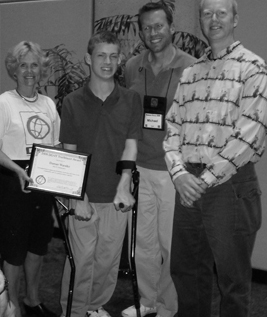
DO-IT Trailblazer Awards highlight DO-IT community members who, through their work and accomplishments, have changed the way the world views people with disabilities and their potential to succeed in college, careers, and community life. Congratulations to this year's honorees!
Daman Wandke, DO-IT Ambassador and '05 Scholar, was recognized for his leadership in organizing disability awareness activities on a postsecondary campus and in the community. As a freshman, Daman founded the Students for Disability Awareness group at Western Washington University and is the program coordinator of the DAMAN Project (Disability Awareness Moving Across the Nation).
Al Souma, coordinator of Disability Support Services at Seattle Central Community College and DO-IT Advisory Board member, promotes awareness of mental health issues, accessibility, and the complex needs of veterans with disabilities in postsecondary education nationwide.
Dr. Mamoru Iwabuchi, associate professor at the Research Center for Advanced Science and Technology at the University of Tokyo, has promoted DO-IT practices internationally. He is the director of DO-IT Japan. This past summer marked the second year Dr. Iwabuchi and his staff provided a Summer Study program to Japanese high school students with disabilities.
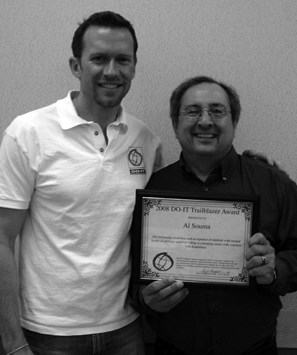
Marissa's Story
Excerpted from America's Afterschool Storybook at www.afterschoolalliance.org/storybook/gallery.cfm?CNT_ID=STRY9000057
I first joined the Disabilities, Opportunities, Internetworking and Technology Program (DO-IT) in 1998 during my junior year of high school… [DO-IT] gave me a chance to experience what college would be like while I was still in high school: sleeping in a dorm, keeping my own schedule, going to lectures, engaging in hands-on activities like dissecting a sheep's heart, and having fun seeing a Mariner's game or visiting the Museum of Flight.
DO-IT has helped me achieve things I would have never gotten the chance to experience without it. They helped me get internships with Amazon.com and later with the Federal Aviation Administration, where I now work. DO-IT's mission is to help people with disabilities succeed in life and fulfill their dreams, no matter how big those dreams are!
Gray Does Matter: Brain Awareness Day
Surrounded by electronic brain-imaging devices, real human brains, and spinal cords that could be touched and examined, more than 700 students, teachers, and parents explored the mysteries of the brain and the many exciting fields of study in health sciences at Brain Awareness Day at the UW Seattle campus.
The DO-IT booth provided visitors with the opportunity to use a Perkins Braille machine to type their names, as well as a wealth of information about the many resources for students with disabilities in education and careers, particularly in science, math, engineering, and technology. Students, teachers, parents, and staff alike all walked away with a bit more knowledge tucked away in and about their gray matter. Put a note on your calendar to join us next spring for this educational event!
UW Engineering Open House
Once again, the UW's College of Engineering Open House was a huge success. More than 7,500 parents, students, and teachers from Washington and neighboring states were in attendance, including many DO-IT Scholars who took time to explore the future of engineering and science! There were more than 125 exhibits from UW engineering departments and outreach programs. Exciting hands-on activities included a giant wind tunnel, robotic cars, a lesson in aerodynamics and paper science through the assembly of paper airplanes, and virtual technology stations.
DO-IT hosted both an informational booth and an assistive technology demonstration area where we were a big hit with our Braille machine, our wheelchair computer game, screen-reading software demo, and head mouse solitaire game. Participants in DO-IT's AccessSTEM project, which is funded by the National Science Foundation (grant #HRD_0227995 and #HRD-0833504) also had a chance to socialize and network with engineering faculty and students.
The Engineering Open House gets better each year, offering students a taste of the many dynamic fields available in engineering. For more information consult www.engr.washington.edu/alumcomm/openhouse.html.
DO-IT's Spring Pizza Party
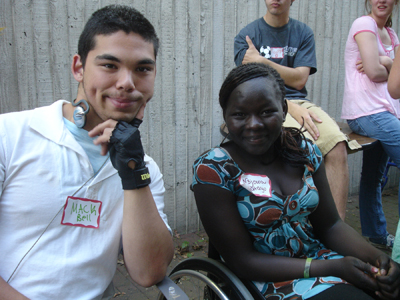
Since DO-IT Scholars, Ambassadors, Pals, Mentors, Parents, and Staff are all a part of the DO-IT family, it's not surprising that we have a good old fashioned family reunion at least twice a year. The 2008 spring DO-IT family reunion, also known as the DO-IT pizza party, was held in Ellensburg, Spokane, and Seattle.
The pizza party is the first opportunity for everyone to meet some of the new Phase I Scholars. This year, new Scholars Emily, Nejowa, Mack, Erik, Yomara, Sam, Brianna, Russell, Aaron, Chris, and Marco attended. Noah, a DO-IT Ambassador currently attending the UW, gave new Scholars a tour of the campus to help them prepare for their return two months later for Summer Study.
In Seattle, the weather was so nice that some of us ate our pizza outside on the patio. Others opted to stay inside for games and a live video feed to the Spokane and Ellensburg parties.
The Scholars are not the only ones who have fun at DO-IT pizza parties. More than thirty parents of Scholars and Ambassadors attended the Seattle party. Their network of support is sustained throughout the year on an online discussion list.
DO-IT Pizza Party: A New Scholar Takes a Bite
My favorite radio station playing, the wind in my hair, and the memories I had from a wonderful school spirit day were replaying in my head. I was wearing all black, because I had taken off my gold boa. (My school colors are black and gold.) My parents and I were going to the DO-IT pizza party, and I was excited because the UW is a school I want to attend! We were the first ones to arrive. I waited a half an hour and then entered the party after I saw that four other people had arrived.
I walked, no wait, rolled in. Right away, I was greeted by smiles. Now you may think I was calm and cool, but that means you have no clue who I am. I worry all the time, and I get nervous easily. To make matters worse, I have never really hung out with people with disabilities. Most of my friends are "normal" (yeah right, they are weirdos, but I love them).
At first I saw people that were physically disabled. Then, Debra, a DO-IT staff member, brought older Scholars Maria and Jesus over to talk to me. My vocal cords are perfectly fine, but at that moment my voice cracked. I was astonished when I heard that Maria had a learning disability, when she looked perfectly fine! Then another older Scholar, Gabe, rolled in on a scooter, and I was frozen. I thought, how is this guy so motivated to go out in public and be so cool? I literally felt like a grain of sand in a big wide ocean-how can I compare to Gabe who is so comfortable in his own skin?
My wonderful parents are the glue holding me together (I'm an only child, so I feel even more spoiled). But then, they took my parents away to the DO-IT parent meeting, and I felt totally abandoned. I felt like I was going to die! I got a name tag, and right away I saw that everyone on the DO-IT staff was extremely nice. Yet, me being me, I decided not to eat because I was too nervous.
Maria and Jesus wheeled me over to a corner where I asked them questions. They answered each one (at least fifty), and I sat there just staring and listening. People talked to me, but I was so shy I felt like I shut them out. I regret that...
Later in the evening other new and older Scholars Nejowa, Mack, Sam, Ashlee, and Noah, joined the conversation. I answered when people asked me something, but I feel now that I could have made more of an effort. Nonetheless, I got to meet some pretty interesting people and everyone was nice. It felt like home, only better, because when you have a physical disability people tend to give you a look or treat you differently. With DO-IT there are no weird looks and everyone just treats you like a "normal" person with feelings.
My parents and I left DO-IT at 7:45 p.m. and on our way back home we stopped at Northgate Mall (remember I had not eaten). I filled up at Chipotle and all I could do was think about the DO-IT pizza party. If that was a DO-IT experience then I couldn't wait to go to Summer Study as a Phase I Scholar! Although I was still a little worried about Summer Study, (that's just me, I don't think I'll ever stop worrying!) the pizza party definitely made me more comfortable about the program and my upcoming Summer Study experience.
Summer Academy for Deaf and Hard of Hearing Students—Year Two!
A highlight of summer 2008 was the second Summer Academy for Advancing Deaf and Hard of Hearing in Computing held on the UW Seattle campus.
Nine bright deaf and hard-of-hearing students from all over the U.S. attended the nine-week academy, where they took classes in computer programming and animation, and met deaf and hard-of-hearing role models already working in the fields of computer science and engineering, information science, information systems, and information technology. The students also participated in corporate site visits to Microsoft, Google, Valve, and Adobe. More information on this program is available at www.washington.edu/accesscomputing/dhh/academy.
The Academy was sponsored by the AccessComputing project and was co-directed by DO-IT Director Sheryl Burgstahler and Dr. Richard Ladner, a professor of Computer Science, and is funded by the Directorate of Computer and Information Science and Engineering (grant #CNS-0540615 and #CNS-0837508) of the National Science Foundation. Rob Roth coordinated the academy.
Scholar Profile
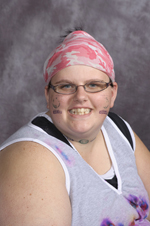
Hi! My name is Shelby, and I'm currently a senior at Eisenhower High School. After I graduate from high school I plan to attend Whatcom Community College and study American Sign Language (ASL). After I graduate, I plan to work at Children's Hospital in Seattle as an ASL teacher and interpreter.
When I was born I had a brain tumor, and the doctors said I had four years to live. Instead of giving up on life, I continued to live to the fullest and push through anything that got in my way. Now I'm seventeen, and have been tumor-free for nine years! I am actively involved in many clubs in school, such as debate. In debate, I went to state competition in my first season, received a letter, and was one spot short of breaking finals in student congress. Another club I'm involved in is Happy Hands, an ASL club. Just this year, I was accepted into one of the most brilliant and outstanding programs around: the DO-IT Scholars program. DO-IT has helped me learn a number of things, including how to write cover letters, thank you letters, and resumes. It has also taught me about how to deal with college, college life, getting scholarships, and how to talk to my teachers about the types of accommodations I will need because of my disability.
In my spare time I have many hobbies. I love to ride motorcycles, play paintball, and volunteer at Children's Village. Through the organization, I (along with other high schoolers and adults) visit elementary and middle schools to explain to children through puppets that even though a kid has a disability it doesn't mean that the person is broken or bad; they are just different. I also volunteer for a program called Epic selling raffle tickets to people at the Yakima Fair. The tickets are for playhouses built by high schools in the Yakima area.
Ambassador Profile
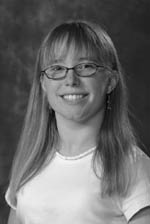
Recently I attended the first dorm wing meeting of the school year at the University of Portland (UP). As we went around the room introducing ourselves and what we did over the summer, I couldn't help but note that not only was I excited to be a senior, but I had the coolest summer job of any of the other resident assistants. Over the summer of 2007, DO-IT set up an internship for me with the Northwest Fisheries Science Center, a line office of the National Oceanic and Atmospheric Administration (NOAA). After a great experience in 2007, I was thrilled to be invited back this summer by Julie Peddy, an administrator at the center and a DO-IT Trailblazer Award recipient.
I worked with the administrative staff, the educational outreach program, and the web content design team. In the smorgasbord of my duties, I improved my skills in Excel, learned the basics of editing professional documents, and honed my business writing and communication skills. Furthermore, I learned to analyze websites for the ease with which a user can find essential content. In 2007, I was given the opportunity to represent the center in Washington, DC. Between job shadowing other Department of Commerce employees, attending a job fair, and exploring the city, I decided that DC is definitely a part of the country I will consider when choosing a graduate school.
The most engaging and rewarding aspect of my job was planning and leading a NOAA Phase II workshop during DO-IT Summer Study 2007 and 2008. In addition to introducing DO-IT Scholars to the field of science and policy creation, I was honored to be given the chance to share some of my experiences setting up accommodations at college and work.
I can't stress enough the importance of taking responsibility for your accommodations and strengthening your self-advocacy skills. In my sophomore year of college, I ran into a medical obstacle (brain surgery), which necessitated a change to my accommodation plan. Because I had already established a strong relationship with the Office for Students with Disabilities and had no qualms about going to my professors to discuss how things had changed, the process of adjusting my accommodation plan was completely painless. I urge all college students with disabilities to develop these relationships. You never know when an unforeseen change will arise, and even if there aren't major problems to deal with, it is best to have these people in your corner.
With my ever-fluid accommodation plan safely in the hands of all my professors, I entered my last year at UP. My schedule includes reading; tutoring; attending plays, basketball games, and midnight barbecues; sometimes avoiding studying by preparing for the LSAT; and looking into financing law school in DC!
Staff Profile
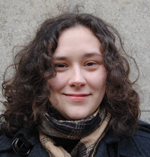
Hi! My name is Ashley and I am a program assistant at DO-IT. I do a variety of tasks around the office but my concentration is with the AccessCollege project. I have worked at DO-IT for three years, beginning as a student assistant.
I recently graduated from the UW with a BA in women studies. While I was a student, I became heavily involved with LGBT (lesbian, gay, bisexual, transgender) and disability activism. I helped found the annual Transgender Awareness Week and have worked on a campaign for gender-neutral, accessible bathroom options on campus. My undergraduate thesis, about the intersections between transgender identity and disability identity, was recently published in the Disability Studies Quarterly. I was a member of Disability Advocacy Student Alliance (DASA) and the student advisory board for the Office of Minority Affairs and Diversity (OMA&D). Quite a busy schedule, but that's why there are so many acronyms in my life!
In my free time I love to go to concerts and plays. I also enjoy traveling. I recently spent my winter vacation visiting Spain, Ireland, England, and Scotland. I studied abroad in Guadalajara for three months as an undergraduate and visited England for the second time this fall.
Tech Tips: Troubleshooting Windows with Linux Live
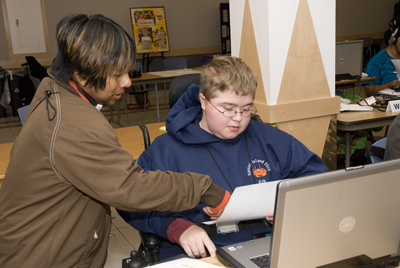
When your Windows machine starts acting erratically and you need to rescue that important file or hop online to check email, there is a useful stopgap measure available. Using what is called a Live CD, you can boot up and run the Linux operating system from the CD and the computer's memory, bypassing the hard drive altogether. This example will use Knoppix.
You'll download an image file with an .iso extension. Using CD/DVD burning software that usually comes with a computer, double-click on the .iso file and it will make a CD or DVD based on the image file. (This is different from just copying files onto a disk, in that it makes the CD or DVD bootable.)
With the Knoppix Live Linux CD or DVD in hand, make sure your computer is setup to boot from the CD/DVD drive. When the computer first powers up, you'll usually see a text message on the screen that states, "F2 to enter setup." (This statement varies by manufacturer and internal components.) Once you have entered the setup program, navigate through the menu choices until you find Boot Order. Follow the directions in that setup program to move the boot order so that the computer first tries to boot from the CD/DVD drive and then other components like the floppy or hard drive. Save this new setting and exit according to the setup program's instructions.
With the Knoppix Live Linux CD or DVD installed in the drive bay, restart the computer. At some point you'll see the Knoppix text on the screen and a command prompt awaiting your input. Press Enter to load the Knoppix Linux operating system. Once it examines all of your unique hardware you'll see a graphic desktop environment similar to that of Windows or Apple machines with a task bar on the bottom of the screen and icons for hard drives with names like hda1, hda2.
One of these drives is your CD/DVD drive; another is the one (or more) of the hard drives installed in your corrupt Windows machine. Clicking on a drive icon will bring up a window showing the contents of the drive.
To rescue needed data, you can insert a USB memory stick in an available USB port, and drag files from the hard drive to the memory stick. You may need to right-mouse click on the USB drive desktop icon and choose Properties to give write permission on the drive if it is in read-only mode.
Once you've recovered all of your important data files, you can then reinstall Windows on the machine.
In addition to giving access to your otherwise inaccessible files, the Knoppix Live Linux CD/DVD gives you a couple of web browsers that can be used to surf the Internet and check your email. This can be handy when you need online access and don't have the time or resources to fix your machine.
It would be wise to make one of these disks before disaster strikes and take the CD/DVD along with you if you are traveling with a laptop.
The Thread: Getting Your Kids on Course for College
In this regular column, I share messages from DO-IT's e-community so that you can get the flavor of the many rich conversations the DO-IT participants have online. Some forum posts are edited for clarity and brevity.
With quite a few DO-IT Scholars about to start their first year of college, many parents of these students have expressed excitement and anxiety regarding this transition. As parents, what are some of your struggles, successes, and questions about this transition?
DO-IT Parent: I have two children transitioning to college out of state. Having children with special needs makes it ten times the work to transition to college, so one huge piece of advice is start early.
A big piece of the transition is, of course, the accommodations; you will need lots of face time with doctors, letters, and other paperwork over and above chart notes and Individualized Educational Program (IEP) documents.
Don't forget about setting up medical services for the college year. In my case, the college's state laws are very different from those of our home state. My insurance plan doesn't offer coverage where my student will attend college.
Another thing to remember is that you are not only transitioning to college or out of state but from pediatric to adult. The age accepted varies by doctor.
Continuity of medications is also a challenge. Regulations don't allow for more than one month's supply of some medications. So you can't stock up for the transition. Some insurance requires a pharmacy and mail order is not an option as it's illegal to ship some medications.
It takes a lot of coordination and cooperation. Be respectful of all of your providers and work with them. Understand their busy schedules. In our case, I've spent about four months trying to find a local doctor who provides the specialties my kids need, will prescribe needed prescriptions, and is covered under my insurance.
Also, plan ahead because doctors and medical staff take vacations in the summer and this extends their response time. Good luck everyone!
DO-IT Parent: Thanks for your thoughts. I am remembering that many residential colleges have a health clinic on campus or a medical insurance plan. Has this changed? Can they be used as resources for referral specialists or coordinating medications? Maybe I was doing some hopeful thinking. Thanks for bringing this up so I can start early.
I was also wondering about hiring personal care assistants (PCAs). My son is in a power chair and needs help in the mornings and evenings. Where do you find people to hire? What are they paid? Do you go through an agency? This is a huge hurdle for my son and me. Thanks for any advice.
DO-IT Parent: Thanks for your questions. I have the same ones. My son is thinking about applying, not out of state, but to the UW Seattle, which means that he would leave home his freshman year, which wasn't what he was originally planning to do. My son is a senior this year, and will be deciding throughout the year whether or not he feels ready to go away to college. He uses an electric wheelchair, and will need morning and evening care as well as someone during the day to help with eating and using the restroom. He will also need help taking notes and studying. It makes my head spin to think about all of it.
If there are parents out there who have had similar circumstances, I would love to hear from you about how you managed it all. Right now, we are concentrating on beginning college applications and looking for scholarships. That is enough! Any advice anyone has would be very much appreciated.
DO-IT Parent: Our son commuted to college from home, so we looked into the King County Metro Transit reduced fare pass sticker. It is a bigger savings than the UW bus pass or a regular pass. A doctor needs to fill out and sign the medical and disability requirement. This needs to be brought to the Metro office in downtown Seattle. Then you pay $3 for an ID card and $99 (this year's price) for the bus pass that covers bus travel for one year. For more information, check out these links: http://transit.metrokc.gov/tops/accessible/reduced_fare_permit.html and http://buypass.metrokc.gov/browse.cfm/2,58.html.
There may be other such bus programs around the country for people with disabilities. Check out the transit system where your student plans to attend college.
DO-IT Parent: My son had trouble figuring out how to ride the bus. He did not get training through his school. Metro used to have a bus riding training course for free which he took part in. It was great. Having Asperger's syndrome, the training service taught him as if he was blind with a trainer who had worked with those who were blind. This was a perfect match for him.
DO-IT Parent: I thought the senior year would be easier than the others, but I'm here to say I was very wrong. This senior year has been so time consuming I was running to keep up. Here are some suggestions:
- Start a binder(s)—you will need it.
- Document and make a to do list, which will grow!
- Make sure your IEP addresses transitional needs and goals. Use this as a source document.
- Make sure all graduation requirements are documented early (fall)—we had a big problem with this due to staff changes, lost files, and school transfers. Thank goodness I keep records or they may not have graduated!
- Start very early looking at scholarships. If the current year isn't available, keep going back and checking. Put it on your calendar. Watch for November and December deadlines. Have reference letters, SAT/ACT scores, copies of transcripts, and other documents ready. Be prepared to do a scholarship application in days.
- We visited campuses to determine mobility issues and resources. Our college plans fell through when our college choice changed in December due to new opportunities, but we weren't ready for the change. You have to stay on top of the offers and keep the doors open with other colleges. Money is short and your student needs to keep looking throughout the scholarship season.
- Be timely and cooperative with your DVR (Division of Vocational Rehabilitation) counselor. When they say no, step back and offer documentation. They want to help. You need to help them help you. Present a planned and organized proposal. They are very busy, so be timely with your request and follow up. DVR has a limited budget but is there to support the independence of your student. Communicate in a professional, respectful way, they will listen and help if they can.
- Work through DVR, the school's accommodation specialist, and SSI to get your student the accommodations they need. Again, start early, find a school that meets your child's needs and has the experience required to set up your child's accommodations. Stay on top of it and it will happen.
Good luck to you all, it's been a roller coaster ride for us, hands down, but it is paying off for our kids!
How Can You DO-IT?
- Sign up to receive DO-IT News if this newsletter was not mailed directly to you.
- Volunteer as a Mentor or to help with one of our Summer Study programs.
- Pass this newsletter on to someone you know who can benefit from our programs.
- Donate money to support and extend DO-IT activities including sponsoring Scholars from states outside of Washington, special events, work-based learning experiences, participant attendant or travel costs, refreshments for program participants, and creation and distribution of educational videotapes and publications.
DO-IT today by completing the form below! You may also make a secure online credit card donation at the University of Washington Make a Gift page by selecting the "DO-IT Program Gift Fund" option.
___ Sign me up to receive copies of DO-IT NEWS, a free program newsletter.
___ Send me more information about DO-IT volunteer opportunities.
___ I would like to make a donation (payable to the University of Washington,Federal ID#91-6001537) to support DO-IT operations.
___ I have enclosed a check for $____________
___ Please charge $____________ to my credit card.
___ VISA ___ Mastercard
Date _____________
Card Number __________________________ Expiration Date _____________
Card Holder Name ___________________________________________________
Signature _____________________________________________________
Address ____________________________________________________________
City __________________________ State _____________ Zip ____________
Phone: Home __________________________ Business ____________________
E-mail: ____________________________________________________________
Your gift is tax-deductible as specified in IRS regulations. Pursuant to RCW 19.09, the University of Washington is registered as a charitable organization with the Secretary of State, State of Washington. For more information, call the Office of the Secretary of State, 1-800-322-4483.
Mail to:
DO-IT
University of Washington
Box 354842
Seattle, WA 98195-4842
Thank you!
More About DO-IT
DO-IT News is published at the University of Washington with input from DO-IT staff, Pals, Scholars, Ambassadors, and Mentors. DO-IT is primarily funded by the National Science Foundation, the U.S. Department of Education, and the State of Washington.
DO-IT (Disabilities, Opportunities, Internetworking, and Technology) serves to increase the successful participation of individuals with disabilities in challenging academic programs such as those in science, engineering, mathematics, and technology. Primary funding for DO-IT is provided by the National Science Foundation, the State of Washington, and the U.S. Department of Education. DO-IT is a collaboration of UW Information Technology and the Colleges of Engineering and Education at the University of Washington.
Grants and gifts fund DO-IT publications, videos, and programs to support the academic and career success of people with disabilities. Contribute today by sending a check to DO-IT, Box 354842, University of Washington, Seattle, WA 98195-4842.
Your gift is tax deductible as specified in IRS regulations. Pursuant to RCW 19.09, the University of Washington is registered as a charitable organization with the Secretary of State, state of Washington. For more information call the Office of the Secretary of State, 1-800-322-4483.
To order free publications or newsletters use the DO-IT Publications Order Form; to order videos and training materials use the Videos, Books and Comprehensive Training Materials Order Form.
For further information, to be placed on the DO-IT mailing list, request materials in an alternate format, or to make comments or suggestions about DO-IT publications or web pages contact:
DO-IT
University of Washington
Box 354842
Seattle, WA 98195-4842
doit@uw.edu
www.uw.edu/doit
206-685-DOIT (3648) (voice/TTY)
888-972-DOIT (3648) (voice/TTY)
206-221-4171 (fax)
509-328-9331 (voice/TTY) Spokane
Founder and Director: Sheryl Burgstahler, Ph.D.